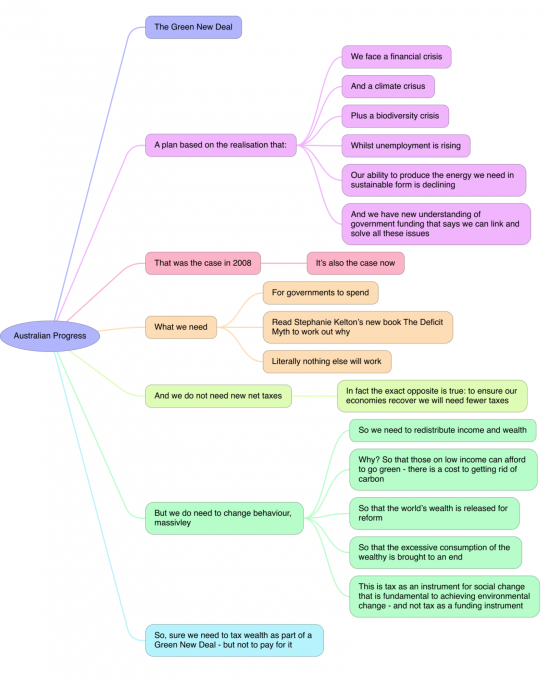I am speaking as part of the Australian Progress conference this morning (literally now, 6am) on the Green New Deal and the need for wealth taxes. The talk is short to allow lots of time for questions so these were my opening comment notes:

And apologies for typos: it's early!
Thanks for reading this post.
You can share this post on social media of your choice by clicking these icons:
You can subscribe to this blog's daily email here.
And if you would like to support this blog you can, here:



Hi Richard
Thanks for your address today, and for the links to http://taxresearch.org.uk/Wiki/2020/05/11/tax-after-coronavirus-tacs/
As a corporate law researcher, I’m interested in how important the “Salomon” doctrine is, the principle that each separate company is necessarily independent. If we were to say that each separate company can yet be an (undisclosed) agent, wouldn’t that be helpful in getting around corporate structures that block accountability?
Tom
I’m groin guy to be candid and so I’m not sure where you’re going here
Each separate company is an (undisclosed) agent of who?
I recognise six generally noteworthy stakeholder groups in most companies. Who are they agent for?
Richard
[…] was asked during the talk that I gave to an Australian conference this morning how I imagined that society could take the power to deliver change, like the Green New […]
Hi Richard
Not every company is necessarily independent. But (as you’re aware) it is a common practice that companies are created in corporate groups, so that the subsidiary takes the liability and the parent takes the profits. The subsidiary acts for itself (in a low-tax jurisdiction), simultaneously with acting for the parent (who’s in a high-tax jurisdiction), to minimise tax.
I’m less familiar with the language of stakeholders. However, there are boards, managers, shareholders, employees, creditors, and also regulators or others to whom the company is socially responsible. If so, each can be characterised as constituting “the company”, in a variety of circumstances. But in terms of taxation, a subsidiary company (as a separate legal entity) can be regarded as the undisclosed agent of its parent company/companies. It acts for itself, separately, simultaneously with acting as an undisclosed agent.
Not sure whether that addresses your response?
With this I entirely agree
And I do not think they are separate entities: indeed I think that no one ever intended limited liability within limited liability: I think that was an accident
Saying this, accountants have recognised this, of course, and the result is consolidated accounts
Lawyers have not. The result is the bifurcation of legal and tax liabilities in ways to suit the group entity as a whole at cost to society at large
Richard